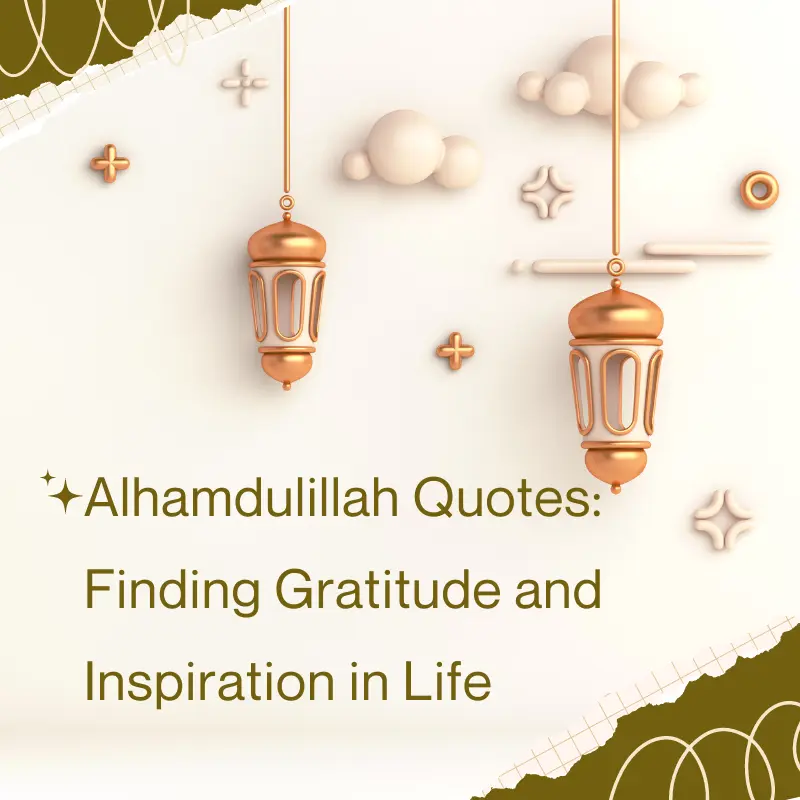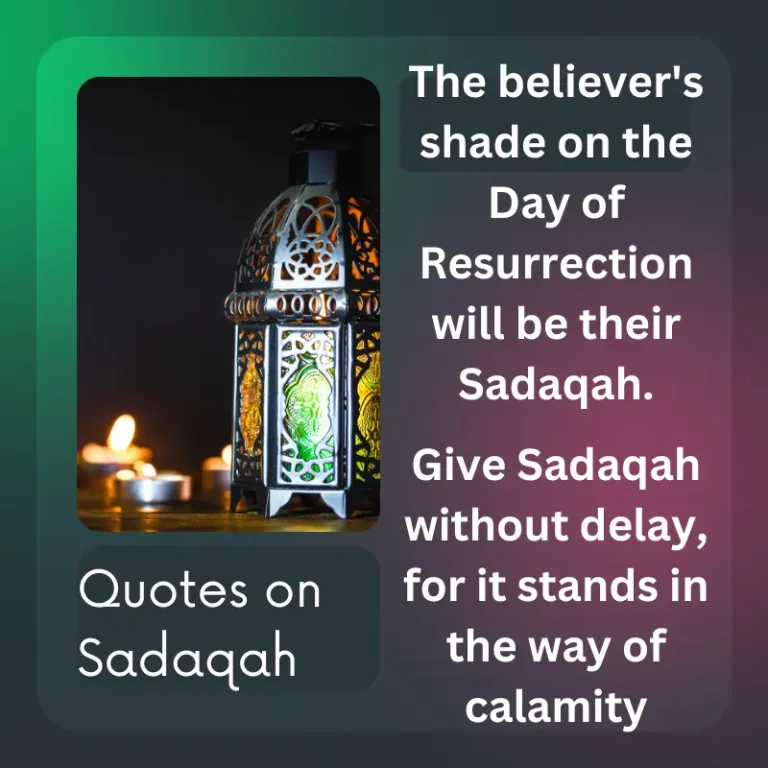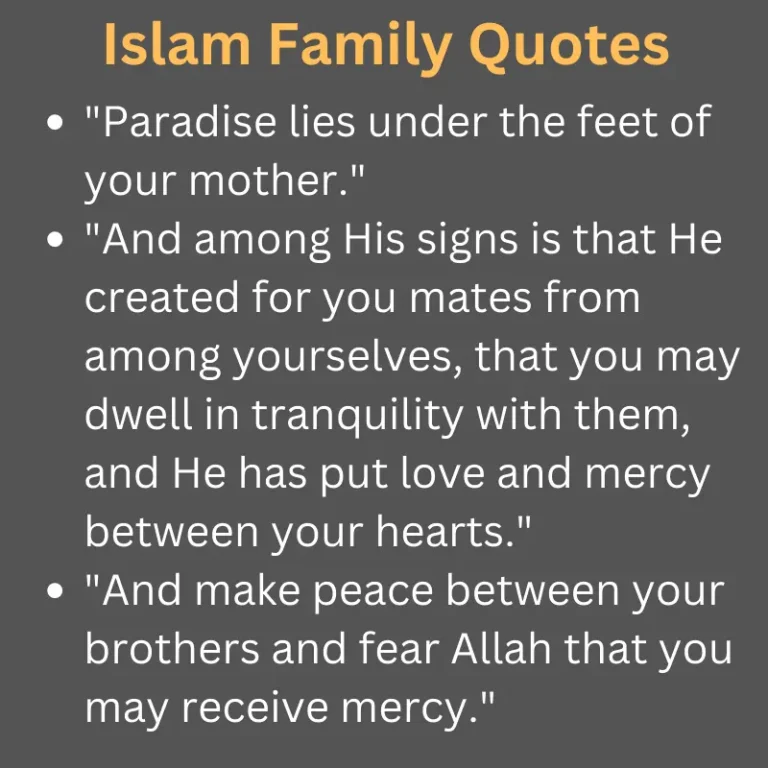Alhamdulillah Quotes: Finding Gratitude and Inspiration in Life
In Islam, the phrase “Alhamdulillah” holds immense significance. It translates to “Praise be to Allah” and serves as a powerful expression of gratitude. Gratitude is a fundamental concept in Islam, emphasizing the acknowledgment and appreciation of blessings bestowed upon us. In this article, we will explore the power of gratitude and its role in our lives. We will provide a comprehensive collection of Alhamdulillah quotes that can inspire and uplift us, bringing us closer to Allah and fostering a sense of contentment and positivity.
The Power of Gratitude
Gratitude is not only a spiritual practice but also a scientifically proven method to enhance our well-being. Studies have shown that practicing gratitude improves mental health, reduces stress, and increases overall life satisfaction. By focusing on the blessings we have rather than what we lack, we cultivate a mindset of abundance and positivity.
In Islam, gratitude is considered an essential aspect of faith. The Quran frequently emphasizes the importance of expressing gratitude to Allah for His countless blessings. By practicing gratitude, we align ourselves with the teachings of Islam and strengthen our connection with the divine.
Alhamdulillah Quotes for Daily Inspiration
Here, we present a collection of Alhamdulillah quotes that can serve as daily reminders to express gratitude and find inspiration in various aspects of life:
Gratitude for Health:
“Alhamdulillah for every breath I take and every beat of my heart. I am grateful for the gift of good health, and I strive to take care of my body as an act of gratitude towards Allah.”
Gratitude for Family:
“Alhamdulillah for the blessings of family. They are a source of love, support, and companionship. I am grateful for every moment shared and the lessons learned through the bond of kinship.”
Gratitude for Success:
- “Alhamdulillah for the opportunities bestowed upon me. Every achievement, big or small, is a testament to Allah’s guidance and blessings. I remain grateful for the chance to excel and make a positive impact.”
Gratitude for Challenges:
- “Alhamdulillah for the challenges I face. They are opportunities for growth, resilience, and self-discovery. I embrace them with gratitude, knowing that they shape me into a stronger individual.”
Gratitude for Nature:
- “Alhamdulillah for the beauty of Allah’s creation. I find solace and inspiration in the awe-inspiring wonders of nature, which remind me of His limitless power and creativity.”
Cultivating Gratitude in Challenging Times
During difficult times, maintaining gratitude can be particularly challenging. However, it is precisely during these moments that gratitude becomes even more crucial. It acts as a lifeline, helping us find hope, strength, and perspective.
When faced with adversity, take a moment to reflect on the blessings that still surround you. Look for the silver linings and the lessons hidden within the hardships. Remember that trials are tests from Allah, and expressing gratitude amidst them is an act of trust and surrender.
Consider the story of Prophet Job (Ayyub), who remained steadfast in his gratitude despite enduring immense suffering. His unwavering faith and gratitude eventually led to his miraculous recovery and restoration of blessings.
Integrating Gratitude into Daily Practices
To make gratitude a consistent part of your life, consider the following practices:
Gratitude Journal:
- Maintain a gratitude journal to jot down three things you are grateful for each day. This practice encourages you to actively seek blessings and reflect on their significance.
Gratitude in Prayers:
- In your daily prayers, include expressions of gratitude to Allah for His blessings. Take a moment during your sujood (prostration) or before concluding your prayer to sincerely thank Him for His guidance, provisions, and blessings in your life.
Mindfulness and Reflection:
- Practice mindfulness by being fully present in the moment and appreciating the blessings around you. Reflect on the beauty of nature, the kindness of others, and the small joys that often go unnoticed. This mindfulness cultivates a grateful heart.
Expressing Gratitude to Others:
- Extend your gratitude beyond your personal prayers by expressing appreciation to those around you. Thank your loved ones, friends, and colleagues for their support, kindness, and presence in your life. This act of gratitude strengthens relationships and spreads positivity.
The Connection Between Gratitude and Contentment
In Islam, true contentment lies in recognizing and appreciating the blessings that Allah has bestowed upon us. Gratitude enables us to find contentment in what we have, rather than relentlessly pursuing worldly desires.
When we constantly seek more without appreciating what we already have, we fall into the trap of materialism and discontentment. However, by practicing gratitude, we shift our focus to the blessings that surround us, nurturing a sense of contentment and inner peace.
Remember the example of the Prophet Muhammad (peace be upon him), who expressed gratitude even in times of hardship. His contentment and trust in Allah’s plan serve as a profound lesson for us to find fulfillment in gratitude.
What is the significance of reciting Alhamdulillah?
Reciting Alhamdulillah is an expression of gratitude to Allah, acknowledging His blessings and recognizing His greatness. It serves as a reminder of our dependence on Him and fosters a sense of humility and appreciation.
How often should I read or recite Alhamdulillah quotes?
There is no specific frequency or quota for reading or reciting Alhamdulillah quotes. However, incorporating them into your daily routine can be beneficial. You can recite them during your morning and evening supplications or incorporate them into your personal reflection and gratitude practices.
Can Alhamdulillah quotes improve my mental health?
Yes, practicing gratitude through Alhamdulillah quotes can have a positive impact on your mental health. It shifts your focus from negativity to positivity, reduces stress and anxiety, and fosters a sense of contentment and inner peace.
Are there specific Alhamdulillah quotes for specific situations?
Yes, there are Alhamdulillah quotes that specifically address various aspects of life, such as gratitude for health, family, success, and challenges. These quotes provide comfort, inspiration, and perspective in different situations.
What is Alhamdulillah thankful for?
Alhamdulillah is a phrase used by Muslims to express gratitude to Allah. It is an acknowledgement of His blessings and a recognition of His greatness. Muslims are thankful to Allah for countless things, including their health, family, provisions, guidance, and the opportunities provided to them. They are grateful for the blessings of Islam, the ability to worship, and the chance to strive for righteousness. Alhamdulillah encompasses a profound sense of appreciation for both the material and spiritual blessings bestowed upon believers.
What Allah said about Alhamdulillah?
Allah, in the Quran, emphasizes the importance of expressing gratitude. He encourages believers to praise Him and acknowledge His blessings. In Surah Al-Fatiha, the opening chapter of the Quran, Allah teaches Muslims to say “Alhamdulillahi Rabbil ‘Alamin” (Praise be to Allah, the Lord of all worlds). This verse signifies the fundamental role of gratitude in Islam. Throughout the Quran, Allah mentions the rewards and blessings He bestows upon those who are grateful. He assures believers that their gratitude will not go unnoticed and that more blessings will be bestowed upon them.
What are the blessing words for Muslims?
Muslims have various blessing words that they commonly use to express gratitude and seek blessings from Allah. Some of these words include:
- Alhamdulillah: “Praise be to Allah.”
- SubhanAllah: “Glory be to Allah.”
- Allahu Akbar: “Allah is the Greatest.”
- JazakAllah khayr: “May Allah reward you with goodness.”
- Barakallahu feek: “May Allah bless you.”
- MashaAllah: “What Allah wills.”
- InshaAllah: “If Allah wills.”
These blessing words are frequently used by Muslims to acknowledge Allah’s greatness, express gratitude, seek His blessings, and recognize His authority over all matters.
What is the best quote for Allah?
“La ilaha illallah Muhammadur Rasulullah” (There is no deity worthy of worship except Allah, and Muhammad is the Messenger of Allah) is one of the most profound and significant quotes for Muslims. This declaration of faith, known as the Shahada, encapsulates the core beliefs of Islam. It affirms the oneness of Allah, His exclusive right to be worshipped, and the prophethood of Muhammad (peace be upon him). This quote serves as a constant reminder for Muslims of their faith, their relationship with Allah, and the principles they strive to uphold in their daily lives.








